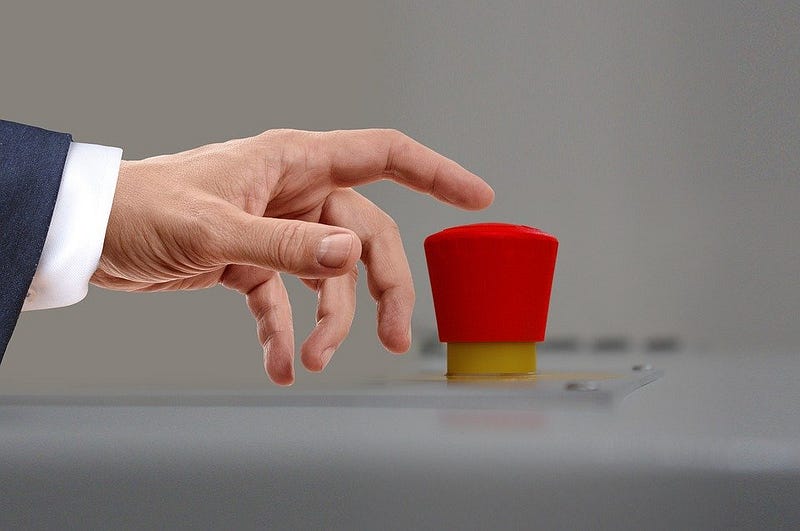You may know the infamous million-dollar button problem. In this story, I try to answer the question: should you press it?
The problem is this: there is a big, red, fat, sexy, tempting button. If you press it within the next 24 hours, you will get one million dollars.
But one random person will die. It could be anyone, except those you care about. Their death won’t affect your life in any way. Nobody will know what you did.
Will you press the button?
 Photo by Pixabay
Photo by PixabayThis problem has become so popular that they even made a movie about it, The Box, and a Twilight Zone episode before that.
If you are like the majority of people, the answer will be… yes, you will press it. 63% would. Just take a look here at the comments.
When I was first introduced to this problem and read some comments, I thought it was just dark humor, and I was fine with that. When I realized that most people were for real, and they would actually press that button, I was horrified.
I don’t mean to be a preacher, nor am I a saint myself, but damn. How could anyone with a moral standard do this?
What Makes A Good Person?
 Photo by Tom Parsons on Unsplash
Photo by Tom Parsons on UnsplashMost of those who would press the button are typically normal, good people. Your neighbor. Your best friend. Your cousin. The person who helps an old lady cross the street. The person who donates to charities. Maybe you are one of them too.
But the fact that most people would be willing to let someone die for money made me lose faith in humanity a bit. I wouldn’t say that I wouldn’t be tempted, but my moral standards usually drive my decisions. I couldn’t live with the guilt.
When asked why they would do this, these people usually present three arguments:
- People die every second. One more death doesn’t make any difference, but one million dollars can change your and your loved ones’ lives.
- There is a possibility that the person who dies is a murderer, rapist, pedophile, terrorist, etc.
- With one million dollars you could save at least two lives, making a positive net moral outcome.
I usually try to be mature about people having different views than mine, but in some cases I just can’t help myself. The first argument is just dumb, if not plain retarded. Yes, it’s true that people die every second. Almost two people do. But it doesn’t justify killing. If you think it does, probably your sense of morality is contradictory.
By that logic, any crime would be justified, as long as you don’t get caught. You could just kill a random person with your own hands and steal their money. In some ways, it’s the same thing. But it doesn’t feel that good, doesn’t it?
There are three possible explanations why you wouldn’t do it in this case, even if you would press the button:
- You don’t want to go to prison, and that’s the only reason. In that case, you are a psychopath.
- You don’t need more money. In that case, why did you even press the button?
- You would feel bad. In that case, you don't have a high moral standard, you just have empathy.
Let’s focus on the third case. Empathy is good, but it’s not everything. A strong morality shouldn’t be based only on emotions, but also on a cognitive component that allows you to value the lives of those you are not emotionally attached to.
This is why most psychopaths (in a clinical sense) are still good people. The best case would be to base your morality on both an empathetic and cognitive component. Yet you can still be good on just a cognitive level, even if you don’t feel empathy. 1% of the world’s population is a psychopath, but few of them are criminals.
This first argument is just as bad as the “but the flu kills many more people” argument made against the lockdown for COVID.
Remember when I said that I’m usually mature about different views but sometimes I fail? Well, the second argument, that the person who dies could be bad, is even more retarded than the first. This is probably the most retarded argument I have ever seen in any discussion. By that logic, you could kill just anyone and feel like a hero. Because, as you say, there’s a good chance that anyone is a bad person, right?
There is a very high chance that the person who is going to die is a loving and caring person, who provides value to society with their job, who has a family and friends who care about them.
Again, I’m not a saint. I can’t be sure of what I would do if that offer would actually be presented to me. But I am not a hypocrite either. I wouldn't use any excuse to justify my greed and selfishness.
Now, the third argument is worthy of more exploration. I wouldn’t believe for a second that most of those who use this argument would actually use the money for good. But let’s just assume they would.
Let’s assume for a moment that you can use your million to save at least two lives. Is it worth it?
The Million Dollar Trolley Problem
 Image by McGeddon — Own work, CC BY-SA 4.0, https://commons.wikimedia.org/w/index.php?curid=52237245
Image by McGeddon — Own work, CC BY-SA 4.0, https://commons.wikimedia.org/w/index.php?curid=52237245This can be seen as a particular instance of the Trolley Problem. The original version of the problem, partially adapted from Wikipedia, is stated as follows:
There is a runaway trolley on a track headed straight towards five people tied up. You are standing next to a lever. If you pull this lever, the trolley will switch to a side track with one person on it. You can either do nothing or pull the lever diverting the trolley onto the side track.
In the former case, five people die. In the latter, just one person dies. Which is the best option?
Most people would agree that one dead person is better than five. The problem is that, if you pull the level, the death of the person on the side track is a direct consequence of your action.
There is no correct universal answer. The best choice depends on your personal approach to ethics. There are three main schools of ethics, that we will discuss in a moment.
Anyhow, most people would pull the lever. But there are more complex scenarios. I will once again take the most popular ones from Wikipedia:
 Image by Jonas Kubilius — Own work, CC0, https://commons.wikimedia.org/w/index.php?curid=39368927
Image by Jonas Kubilius — Own work, CC0, https://commons.wikimedia.org/w/index.php?curid=39368927- The fat man: you are on a bridge above the track with a fat man in front of you. If you push him over the bridge, he can stop the track. He would die but the five people would be saved.
- The fat villain: same as before, but the fat man is the one who put those five people on the track.
- The loop: you can divert the trolley on a secondary track like in the original scenario, but the secondary track rejoins the main one later. On the secondary track there is a fat man who would stop the trolley.
- The man on the yard: you can collide another trolley to the main trolley, so that both are derailed saving the five people, but they crash into a yard where there is a man who gets killed.
- The transplant: there is no trolley, but you are a surgeon with five patients, Each of them is in need of a different organ, otherwise they die. There is no donor, but a healthy man comes for a routine checkup. You can take the organs from him, killing him, but saving the five patients.
As you can see, the “would you press the button” problem is just another variant of the Trolley Problem, in which you can either do nothing and let N people die, or let one person die to get one million dollars that you can use to save those N people.
The correct answers to these problems depend on which of the three main schools of ethics you value the most.
What If Hitler Was A Hero?
 Photo by Giammarco Boscaro on Unsplash
Photo by Giammarco Boscaro on UnsplashNow that I triggered you with the title, it’s time for a brief lecture on ethics. The three major schools of ethics are Virtue Ethics, Consequentialism, and Deontology:
- Virtue Ethics is based on integrity, i.e. being true to a set of values. Each one of us has an instinctive set of moral values or virtues, e.g. we all know that killing is wrong, so we should never do it unless it is necessary to fulfill a greater virtue. We should aspire to always be consistent with that set of virtues. Aristotle is one of the major proponents of this school and, among other things, he wrote his own list of virtues and vices.
- Consequentialism is based on, well, consequences. Your actions aren’t inherently good or bad. Their effects are, including the indirect ones. Killing may be wrong for most people, but if killing one person would save two, not killing that person would be the wrong choice. Consequentialism is a family of theories, each theory differs from the others on the metrics that are used to measure consequences. One of the most popular consequentialist theories is Utilitarianism, founded by Jeremy Bentham, which strives to maximize the total happiness of all humans.
- Deontology is based on fixed rules. It doesn’t matter whether your actions reflect your values or what their consequences are, as long as they are in accordance with the rules. Killing is wrong if and only if it’s a rule, it doesn’t matter how you feel about it. Most religions are deontological, but not all deontologists are religious. One of the major proponents of this school is Immanuel Kant.
If you know which school is the right one for you, the answer to trolley problems is usually very easy.
To most trolley problems, the right answer according to Virtue Ethics and Deontology would be to do nothing, while the right answer according to Consequentialism would be to take action (pull the lever, push the fat man or steal the organs from the healthy man).
It’s easy to see why ethics is so messed up, it’s because these three schools can be very contradictory.
Deontology is the “easiest” one. You follow the rules, and you are good. That’s why most religions follow this school. The Ten Commandments are a set of rules to be followed no matter what. If you follow them, you are good and go to heaven. If you don’t, you are bad and burn in hell (even though some Christian doctrines value Virtue Ethics as well as Deontology).
In my personal view, I think that Deontology is the school that makes the least sense. Which set of rules should we follow, and why that specific set? Who dictates these rules? Is there a more profound meaning to them? Rules can’t possibly cover every case, and sometimes they should be wisely broken.
Virtue Ethics makes a bit more sense, but I think it’s not sufficient. There is a connection between this school and the empathetic morality we talked about before, because empathetic morality only takes into account the direct consequences of your actions, like Virtue Ethics.
Still, there are scenarios in which you wouldn’t feel much empathy, even if your actions have direct bad consequences. According to Virtue Ethics, you should not press the button, because the direct consequence is a dead person.
Consequentialism, in particular Utilitarianism, is the best one in my opinion. It literally transforms morality into a utility function and, as an engineer, it makes me weirdly happy.
The problem with Utilitarianism is that it’s very difficult to live by it.
I would never have the guts to push the fat man or kill baby Hitler, even if these would be the best choices according to my philosophy. But I would pull the lever. The problem is essentially the same, but I would act differently depending on how much empathy that scenario makes me feel.
In worst-case scenarios, Utilitarianism can make us confused as hell on what’s good and bad, because a good action can have indirect bad consequences and vice versa.
For example, we pretty much all agree that Hitler was a bad guy. But what if one of the Jews in the concentration camps, was actually a sociopath that was about to nuke the entire world and would have led us to extinction?
It would be very difficult to verify that, but if this was true, not only Hitler wasn’t a bad guy after all, but he was the best guy ever, according to Utilitarianism.
Louis Pasteur invented the vaccine, saving the lives of millions if not billions. He was a very good guy. But what if, among the lives he saved, there was a serial killer who killed another guy who would have invented not only vaccines, but also the cure to every human disease? In that case, Pasteur would be worse than Hitler.
Living 100% by Utilitarianism would drive us insane. We can’t possibly know for sure what the indirect consequences of our actions are. This is why, in my opinion, we need both Utilitarianism and Virtue Ethics. In most cases, the latter serves as a good heuristic for the former. I doubt that Hitler made the world a better place, and I also doubt that Pasteur made it worse. Also, I will always see the former as a villain and the latter as a hero, no matter what the real consequences of their actions were.
Back to our button, should we push it? Deontological rules often tell us that killing is wrong, so if we follow that school, we shouldn’t. There isn’t much virtue in killing a person for money, so if we follow Virtue Ethics, we shouldn’t either.
But if we follow Utilitarianism, and we can use that million to save at least two lives, we should (for simplicity, we consider all the involved people similar, so that there are no heroes or villains between them).
I want to answer the original question “should you press the button?” with a utilitarian perspective. To do that, we need to ask another question: how many lives can one million dollars save?
Effective Altruism For The Utilitarian Soul
 Photo by Perry Grone on Unsplash
Photo by Perry Grone on UnsplashTwo years ago I was introduced to the philosophy of effective altruism. It has been popularized by the website 80,000 Hours, which is a fantastic source of information (no, I’m not affiliated to them).
Some of us, at some point in our lives, start thinking about giving to charities. But do we ever ask questions like: is this particular charity effective? Which charity is the best one? How could I maximize the number of helped lives with my money?
Effective altruism is exactly what the name suggests, i.e. altruism done in an effective way. It’s not enough to give money away, you should also be aware of how your money is used and who could use it most effectively.
Giving money per se is good for Virtue Ethics, but not for Utilitarianism. Effective altruism is based on the utilitarian philosophy.
Luckily, 80,000 Hours answers all the questions for you. For example, they tell you which charity to donate to, or which career path can be the most impactful for you.
They can also tell you how many lives could a million dollars save if used effectively.
They claim that some charities are 10, 100, 1000 times more effective than others. In this post, they make the following example:
- You can provide a first-world blind person a guide dog for about 10 years, which costs $10,000 to be trained.
- You can give cataract surgery to a third-world blind person, which costs $35.
Now, if you think that a first-world life and a third-world life have the same value, it’s obvious that as a utilitarian you should spend in cataract surgeries.
This is an example of what in economics is known as marginal cost theory. If you want to help as many people as possible, keep in mind that many of them require very little support. The more people you help, the higher is the additional cost for helping an additional person.
Yes, at some point, if you help all third-world blind people, you should pay those $10,000 to train a guide dog for a first-world person. But that’s not the case yet, since there are so many people in the third world who could be helped with simple cataract surgery.
That’s why Effective Altruism focuses mostly on the third world while neglecting problems in the first world. Lives in the third and first worlds have the same value, but they have different needs and the required effort is different too. For every first-world person who is saved, tens if not hundreds of third-world people are not.
If you are driven only by empathetic morality, you may have a feeling that there is something wrong with this approach. I assume that you, like me, live in a WEIRD country (Western, Educated, Industrialized, Rich, Democratic). WEIRD people often feel empathy only for other WEIRD people, even if they would never admit it, because they are only used to a WEIRD lifestyle. We often forget that a non-WEIRD life has the same value as a WEIRD one (yes, WEIRD people are actually “weird” because they are a minority of the world’s population).
So, how many lives can you save with one million dollars? GiveWell is a meta-charity, i.e. a charity that evaluates the effectiveness of other charities, and they estimate that you can save a life with as little as $3,340 by giving to the AMF (Against Malaria Foundation), a charity that distributes malaria nets in sub-Saharan Africa.
We finally have the answer. By pressing the button, you would kill one random person, but their sacrifice could potentially save 300 other lives.
Now, if you think that this whole story was just an excuse to convert you to Effective Altruism, you got me. Sorry.
If you are one of those people that would press the button for their own selfish interests, I know I didn’t convince you, and I won’t try further effort. Still, I don’t think you are one of them, because you would have stopped reading this long ago.
But if you are one of those people interested in doing good with a utilitarian mindset, I hope you will consider this new framework for your future altruistic efforts. If you are already giving, why not do it in the most effective way?
Back to the original question. Since I value Utilitarianism more than other schools, if I was in front of that red button, I would probably push it and donate all to the AMF. But still, the part of me which values Virtue Ethics would make me feel guilty for the rest of my life.